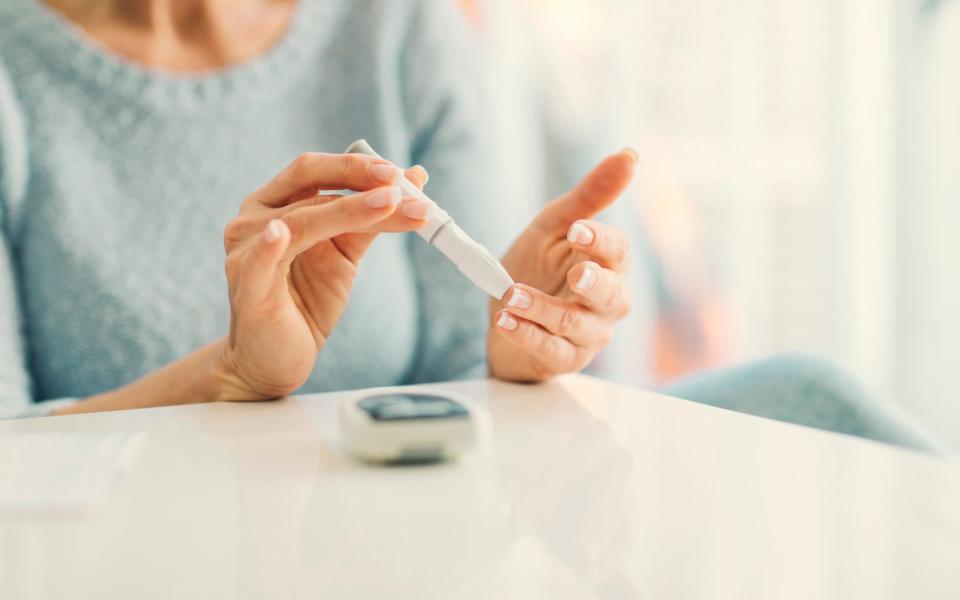How to spot the nine 'secret' symptoms of diabetes you might not know about

Today is World Diabetes Day, the highlight of a month-long campaign run by the International Diabetes Federation to raise awareness about the condition and its symptoms.
The organisation points out that, globally, the number of people with diabetes is expected to rise to 522 million by 2030 (in the UK alone there are already over 3 million people with diabetes and, based on current trends, this could reach over 5.5 million by 2030.)
Worryingly, given these figures, diabetes is the leading cause of heart disease, stroke, blindness and kidney failure – but the good news is that 80pc of cases of Type 2 diabetes are preventable through the adoption of a healthy lifestyle.
A shocking NHS report last month showed that hundred of diabetes sufferers are dying prematurely each week, and that deaths have increased by roughly 10 per cent over the past three years.
Meanwhile, research from Oxford University has found unhealthy living to be even more dangerous for the female cardiovascular system – which means that women are at greater risk of diabetes caused by an unhealthy lifestyle than men.
The figures are frightening, but if you can spot the warning signs early, you can make those life-changing tweaks before the ramifications for your health escalate.
According to Dr Matthew Capehorn, GP and clinical manager of the NHS Rotherham Institute for Obesity, as well as the medical director at LighterLife and a member of the Obesity Empowerment Network, knowledge is power. “Up to 85% of cases of type 2 diabetes is associated with poor lifestyle, such as being overweight or obese, eating an unhealthy diet, and not getting enough physical activity – all of which can increase the likelihood of having the dangerous visceral fat which leads to the insulin resistance. (Visceral fat is the fat that gathers around the vital organs.)
“Often, people believe that having diabetes means avoiding sugar. Obviously, in a body struggling to cope with blood-sugar levels, this will help – but in type 2 diabetes it’s more about reducing the dangerous visceral fat, which will often involve meaning getting down to a healthy weight.
“Initially, and for many years, type 2 diabetes may have no noticeable symptoms at all, making it difficult to diagnose unless it’s picked up by routine health screening programmes. The diagnosis often comes as a shock. Research by the International Diabetes Federation shows that by the time they are diagnosed, many patients may have had increasing insulin resistance for up to 10 years.

“It’s very important to remember that undiagnosed type 2 diabetes may have no symptoms at all. If you have lots of the following possible symptoms of diabetes, or if you feel any are severe, then it increases the likelihood that you may have type 1 diabetes, and it certainly means you should get checked out by a healthcare professional as soon as reasonably possible.
"But do remember that many of these symptoms – such as feeling thirsty, hungry or sick, having blurred vision, peeing more and so on – are common, and could equally mean something else is going on.”
1. Sudden weight or muscle loss
"Unless it is controlled weight loss as part of a diet, a sudden drop in your weight may not be a good thing. A drop of more than 5%, or unexplained weight loss in the region of half a stone per month or more for a few months, needs investigating.

"In the case of diabetes, it’s much more likely to be associated with type 1 diabetes. Carbohydrates in the food you eat are broken down into glucose (a type of sugar), but the lack of insulin (or, in the case of type 2 diabetes, the body’s resistance to it) results in this glucose not being taken up by the body’s cells, and ultimately it’s lost in your pee.
"The energy (calories) in the sugar that is peed out is one reason for weight loss, but it’s made worse by the fact that the body may then have to break down fat or even muscle for fuel, making the weight loss more noticeable."
2. Persistent hunger
"The feeling of being hungry is complicated. You may be hungry for physiological reasons – when your body is telling you to eat because it’s low on fuel. However, many of us eat when we’re not really hungry – out of habit, or for comfort – and we know that people’s emotional relationship with food is a contributing factor to the growing rates of obesity in society.
"After your evening meal you should be full for 6-8 hours, so if you get the munchies an hour or two later in front of the television, it’s more likely to be psychological hunger. However, if your body isn’t correctly metabolising the sugars you eat and using them for fuel, you may be left feeling persistently hungry, so it’s always worth considering a diagnosis of diabetes."
3. Peeing more often
"Needing to pass urine much more frequently, perhaps with a degree of urgency, and especially during the night, should always be investigated. It could just be as a result of having drunk too much (especially of bladder stimulants such as caffeine or alcohol). If it hurts when you pee, you could have a bladder infection, or it could mean that you have an irritable bladder that your doctor may be able to help you manage.
"However, it can also be a symptom of more sugar in the blood, increasing the kidney’s role to excrete it, by making us want to pee more often. Having sugar in your urine can mean other problems too, so it’s definitely worth getting it checked."
4. Feeling "TATT"

"Feeling tired all the time (or "TATT" for short) is a very common symptom, but could also be due to undiagnosed diabetes, as the body is not metabolising the sugars in the diet for energy in the correct way – causing chronic tiredness, even when sleeping well."
5. Itchy bits
"Most of the time, genital itching is caused by a yeast infection, when the fungus Candida albicans that is naturally present in your vagina grows unchecked. Most women experience it at some point, but if it’s happening regularly, it’s vital to speak to your doctor.
"High blood sugar levels provide the perfect conditions for vaginal yeasts to multiply, so an increase in thrush or other yeast infections can occur. Type 2 diabetes can also suppress your immune response, making thrush more likely."
6. Skin disorders
"A change in season, temperature or even shower gel can irritate your skin, but some conditions are closely linked to type 2 diabetes. However, some skin conditions, including acne and recurrent or persistent cysts or other infections, are associated with poor control of blood sugar levels, so they should alert you to the possibility of a diagnosis of diabetes."
7. Unquenchable thirst
"It’s speculated that we as a nation in the UK generally don’t drink enough fluids, so we’re living in a state of mild chronic dehydration. On a hot day, after exercise, or after a particularly salty meal, you might feel especially thirsty – all normal and expected.

"However, it’s not normal to be knocking back the water all of the time and feeling like you can’t ever quench your thirst. This is a classic symptom of diabetes, but again it’s most likely to be associated with type 1 diabetes.
"The reason for the thirst is complex, but it can be a case of your kidneys needing the extra fluid to flush out the excess sugar."
8. Cuts that won’t heal
"Chronically high blood-glucose levels reduce your immune system’s ability to fight infection, restrict your circulation so it takes longer for blood vessels to deliver healing substances to a wound, and damage nerves so you might not be as aware that you’ve hurt yourself because of a lack of sensation.
"Plus, an untreated open wound can lead to further health complications – in fact, poorly controlled type 2 diabetes one the most common cause of amputation in the UK. It’s very easy to accidentally cut yourself but then not notice exactly how long it takes to heal, and yet this can be a good indicator of general cardiometabolic health."
9. Blurred vision
"Blurred vision can be caused by damage to the lens inside your eye from high sugar levels, which can also harm the tiny blood vessels in your retina. Most routine optician checks look for damage to the those blood vessels, and if any is detected you need to book a check-up with your doctor.
"Untreated, this eye damage (retinopathy) can lead to blindness, and in adults it’s actually one of the leading causes of sight loss. Unfortunately, in the same way that insulin resistance can have been present for many years before someone is diagnosed with diabetes, the vision damage may have been occuring for some time, too. Spotting the symptoms and getting early treatment can cut the risk of going blind by 95%."
For a comprehensive guide to the symptoms of diabetes and advice on when to see your doctor, visit nhs.uk.

 Yahoo News
Yahoo News 